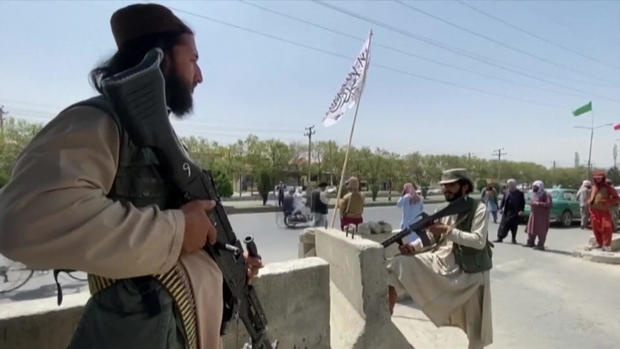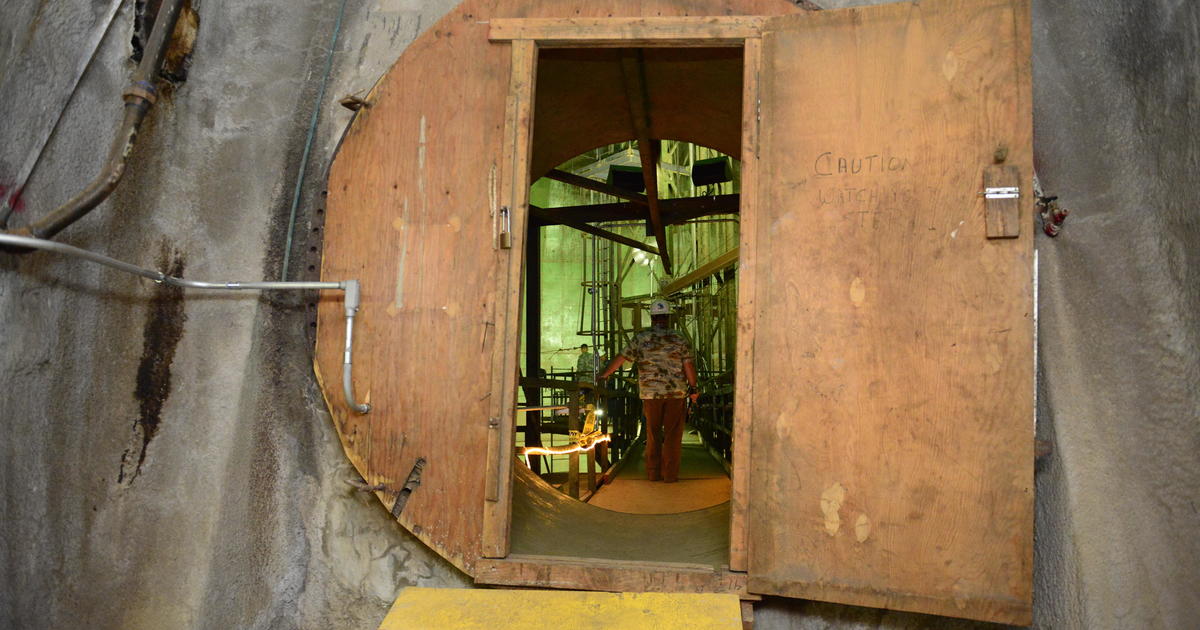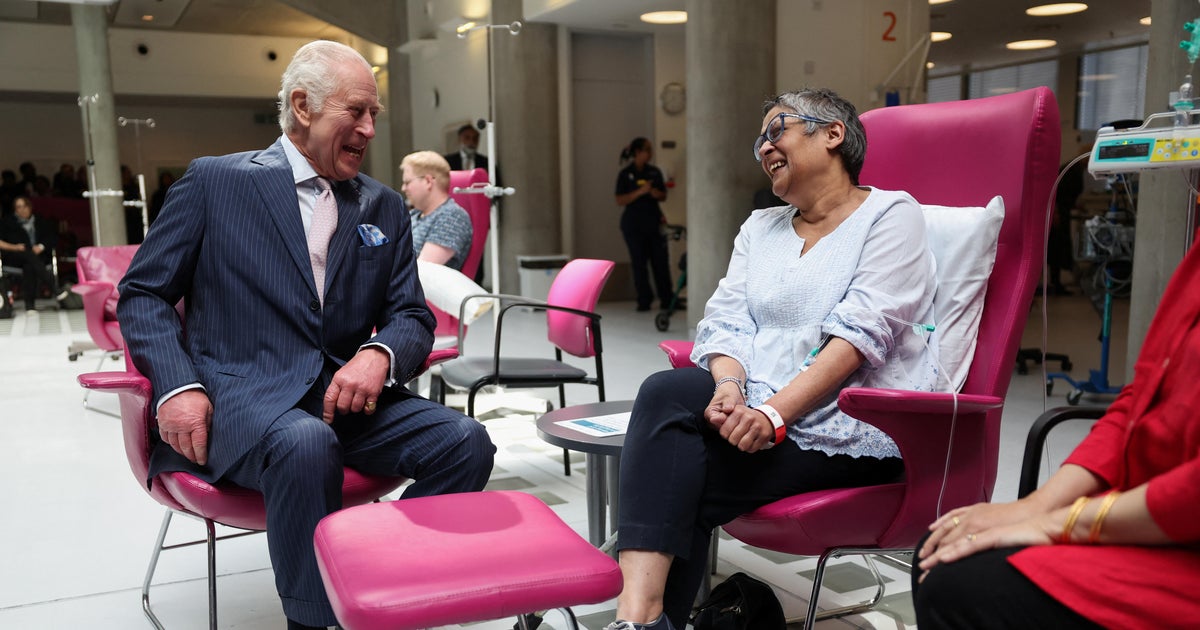11 days in August: How Afghanistan fell
It's been barely a week since the Taliban seized control of Kabul, the capital of Afghanistan. Their return to power was swift and organized. We asked CBS News national security correspondent David Martin to help us make sense of what's happened, and why, and what it potentially means:
"There was nothing that I or anyone else saw that indicated a collapse of this army, and this government, in 11 days," Gen. Mark Milley, chairman of the Joint Chiefs of Staff, said on Wednesday.
The collapse no one saw coming began on Friday, August 6, with the fall of a provincial capital in the far west of Afghanistan. The White House said it was time for the Afghans to step up.
White House press secretary Jennifer Psaki said, "Now is the moment for the leadership and the will in the face of the Taliban's aggression and violence."
In the next two days – August 7-8 – four more provincial capitals fell, including the key city of Kunduz, which surrendered without a fight. That night, Gen. Frank McKenzie, the commander of U.S. forces in Afghanistan, alerted the Pentagon: Kabul could be surrounded within 30 days – an alarming prediction that turned out to be way off.
On August 9, Pentagon spokesman John Kirby said, "Clearly the security situation is deteriorating. And just over the last, what, 72 hours, roughly five provincial capitals fell to the Taliban. That's deeply concerning."
And they kept falling, as one after another, Afghan units – trained and equipped by the U.S. – gave up without a fight.
By August 12, Ghazni, just south of Kabul, was in Taliban hands.
Joint Chiefs Chairman Milley warned that the Taliban was within 24 hours of Kabul, and the Pentagon ordered in combat troops to reinforce the airport and safeguard the evacuation of Americans from the embassy.
"The first movement will consist of three infantry battalions," said Kirby. "They will move to Hamid Karzai International Airport in Kabul within the next 24 to 48 hours."
On August 13, Taliban leaders assured U.S. officials they only intended to surround the capital, not take it.
"Kabul is not, right now, in an imminent-threat environment," Kirby said. "But clearly, David, if you just look at what the Taliban's been doing, you can see that they are trying to isolate Kabul."
Last Saturday (August 14), Gen. McKenzie, the Central Command chief, flew to the Persian Gulf to meet face-to-face with Taliban leaders. He took a map showing a 25-kilometer area around the airport, intending to warn the Taliban to stay out or their fighters would be attacked.
But by the time they met on Sunday, August 15, Taliban fighters were already rolling into the city, and all McKenzie could do was tell them not to interfere with the evacuation.
Afghan President Ashraf Ghani fled the country, and the Taliban were taking selfies in the presidential palace.
The collapse of the house of cards erected over 20 years was complete.
"It was a very hollow government and a hollow military," said John Sopko. Since 2012 Sopko has been the watchdog for reconstruction as the special inspector general for Afghanistan, issuing report after report calling out failed projects and rampant corruption.
Just this past week he issued a "Lessons Learned" report:
"I did not think it would collapse this quickly," Sopko told Martin. "Although once it happened, we realized that all the preconditions for failure were there."
The report is based on his own inspections in Afghanistan, and on more than 700 strikingly candid interviews, with senior administration officials, down to aid workers in the field, none more candid than Douglas Lute, who served as a special advisor on Afghanistan to Presidents Bush and Obama.
"We were devoid of a fundamental understanding of Afghanistan," Lute told the inspector general. "We didn't have the foggiest notion of what we were undertaking. It's really much worse than you think."
In another interview, Ryan Crocker, former ambassador to Afghanistan, described the Afghan police: "They're useless as a security force, and they're useless as a security force because they are corrupt down to the patrol level."
"This endemic corruption is also one of the key reasons of the success of the Taliban," Sopko said. "When we poured money like manna from heaven on Afghanistan, what would you expect? They grabbed it. We contributed to the corruption by just pouring too much money."
$145 billion went into rebuilding Afghanistan, producing (according to President Biden) an Afghan army and police that should have been capable of holding its own against the Taliban.
In a speech on Tuesday, Mr. Biden said, "We trained and equipped an Afghan military force of some 300,000 strong, incredibly well-equipped."
Martin asked Sopko, "Was that a real 300,000?"
"That's what the Afghans reported," he replied, "but we knew that there were serious problems with what we call 'ghosts.' That means people on the rolls who don't exist, but whose salary and everything else is just stolen by Afghan officers and generals."
And it was more than salaries; it was all the supplies for those ghost soldiers and policemen. "The U.S. general told us 50 percent of the fuel we provided to the Afghans was stolen – 50 percent," Sopko said. "We were talking about billions of U.S. dollars."
But sheer waste doesn't explain why Afghan armed forces couldn't, or wouldn't, fight once the U.S. withdrew.
- U.S. grapples with fallout from Afghanistan withdrawal with Taliban back in control
- Afghanistan evacuation efforts continue amid airport chaos, security threat
"Why couldn't the Afghan army become less dependent on the United States?" Martin asked.
"We didn't let them become less dependent," Sopko replied. "If the Afghans couldn't deliver the food or buy the fuel, we did it for them. So, we essentially made them dependent. We gave them equipment that they didn't know how to maintain, and couldn't sustain. They just couldn't function without us."
Martin said, "But the military officers who were advising and assisting the Afghan army must have seen all this in detail. Were they warning that as soon as we pull our support, they're going to collapse?"
"It was the U.S. Air force that first alerted us and alerted the Pentagon that without U.S. or coalition contractor support, the Afghan air force would collapse within a matter of months," he said.
The American way of war simply did not work for the Afghan military. While child mortality rates went down over the last 20 years, sick babies must now be lifted over barricades to get care. The scenes of chaos at Kabul airport promise to be the most indelible of the "lessons learned" from the American failure in Afghanistan.
Martin asked, "The debate's going to take place: who lost Afghanistan?"
"The United States lost Afghanistan," Sopko replied. "There's a lot of mistakes to go around for everybody. And I think, in my humble opinion, a healthier question is, what did we learn from those 20 years so we don't repeat it again?"
Story produced by Mary Walsh. Editor: Joseph Frandino.
See also:
- Russia has been engaging with the Taliban for years. The U.S. withdrawal might give it an opportunity to expand its role.
- IMF denies Taliban access to millions in Afghanistan funding




